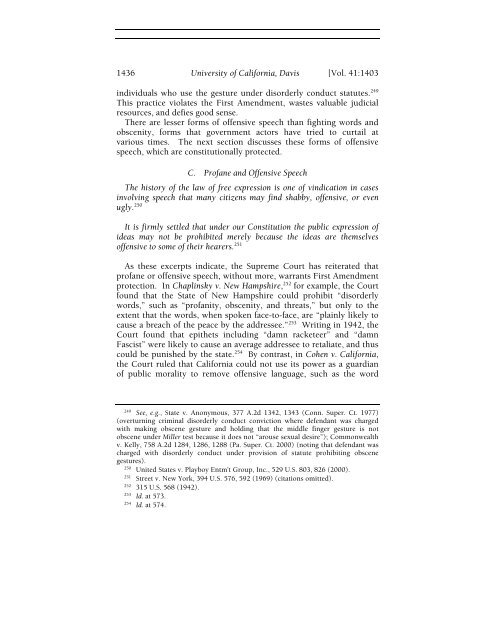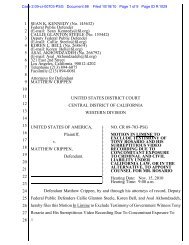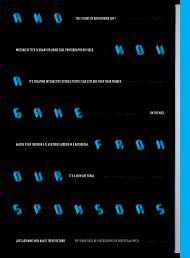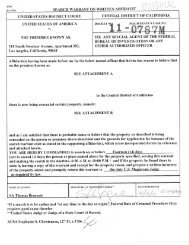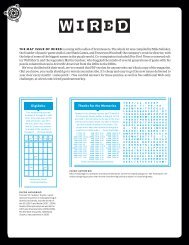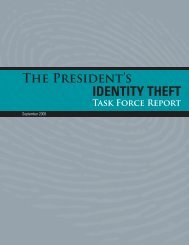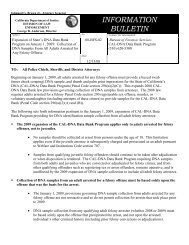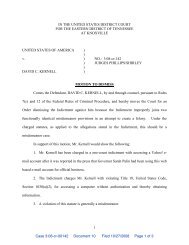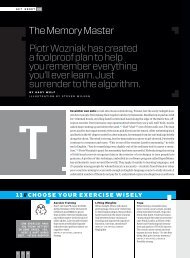Digitus Impudicus: The Middle Finger and the Law - Wired
Digitus Impudicus: The Middle Finger and the Law - Wired
Digitus Impudicus: The Middle Finger and the Law - Wired
Create successful ePaper yourself
Turn your PDF publications into a flip-book with our unique Google optimized e-Paper software.
1436 University of California, Davis [Vol. 41:1403<br />
individuals who use <strong>the</strong> gesture under disorderly conduct statutes. 249<br />
This practice violates <strong>the</strong> First Amendment, wastes valuable judicial<br />
resources, <strong>and</strong> defies good sense.<br />
<strong>The</strong>re are lesser forms of offensive speech than fighting words <strong>and</strong><br />
obscenity, forms that government actors have tried to curtail at<br />
various times. <strong>The</strong> next section discusses <strong>the</strong>se forms of offensive<br />
speech, which are constitutionally protected.<br />
C. Profane <strong>and</strong> Offensive Speech<br />
<strong>The</strong> history of <strong>the</strong> law of free expression is one of vindication in cases<br />
involving speech that many citizens may find shabby, offensive, or even<br />
ugly. 250<br />
It is firmly settled that under our Constitution <strong>the</strong> public expression of<br />
ideas may not be prohibited merely because <strong>the</strong> ideas are <strong>the</strong>mselves<br />
offensive to some of <strong>the</strong>ir hearers. 251<br />
As <strong>the</strong>se excerpts indicate, <strong>the</strong> Supreme Court has reiterated that<br />
profane or offensive speech, without more, warrants First Amendment<br />
protection. In Chaplinsky v. New Hampshire, 252 for example, <strong>the</strong> Court<br />
found that <strong>the</strong> State of New Hampshire could prohibit “disorderly<br />
words,” such as “profanity, obscenity, <strong>and</strong> threats,” but only to <strong>the</strong><br />
extent that <strong>the</strong> words, when spoken face-to-face, are “plainly likely to<br />
cause a breach of <strong>the</strong> peace by <strong>the</strong> addressee.” 253 Writing in 1942, <strong>the</strong><br />
Court found that epi<strong>the</strong>ts including “damn racketeer” <strong>and</strong> “damn<br />
Fascist” were likely to cause an average addressee to retaliate, <strong>and</strong> thus<br />
could be punished by <strong>the</strong> state. 254 By contrast, in Cohen v. California,<br />
<strong>the</strong> Court ruled that California could not use its power as a guardian<br />
of public morality to remove offensive language, such as <strong>the</strong> word<br />
249 See, e.g., State v. Anonymous, 377 A.2d 1342, 1343 (Conn. Super. Ct. 1977)<br />
(overturning criminal disorderly conduct conviction where defendant was charged<br />
with making obscene gesture <strong>and</strong> holding that <strong>the</strong> middle finger gesture is not<br />
obscene under Miller test because it does not “arouse sexual desire”); Commonwealth<br />
v. Kelly, 758 A.2d 1284, 1286, 1288 (Pa. Super. Ct. 2000) (noting that defendant was<br />
charged with disorderly conduct under provision of statute prohibiting obscene<br />
gestures).<br />
250 United States v. Playboy Entm’t Group, Inc., 529 U.S. 803, 826 (2000).<br />
251 Street v. New York, 394 U.S. 576, 592 (1969) (citations omitted).<br />
252 315 U.S. 568 (1942).<br />
253 Id. at 573.<br />
254 Id. at 574.


